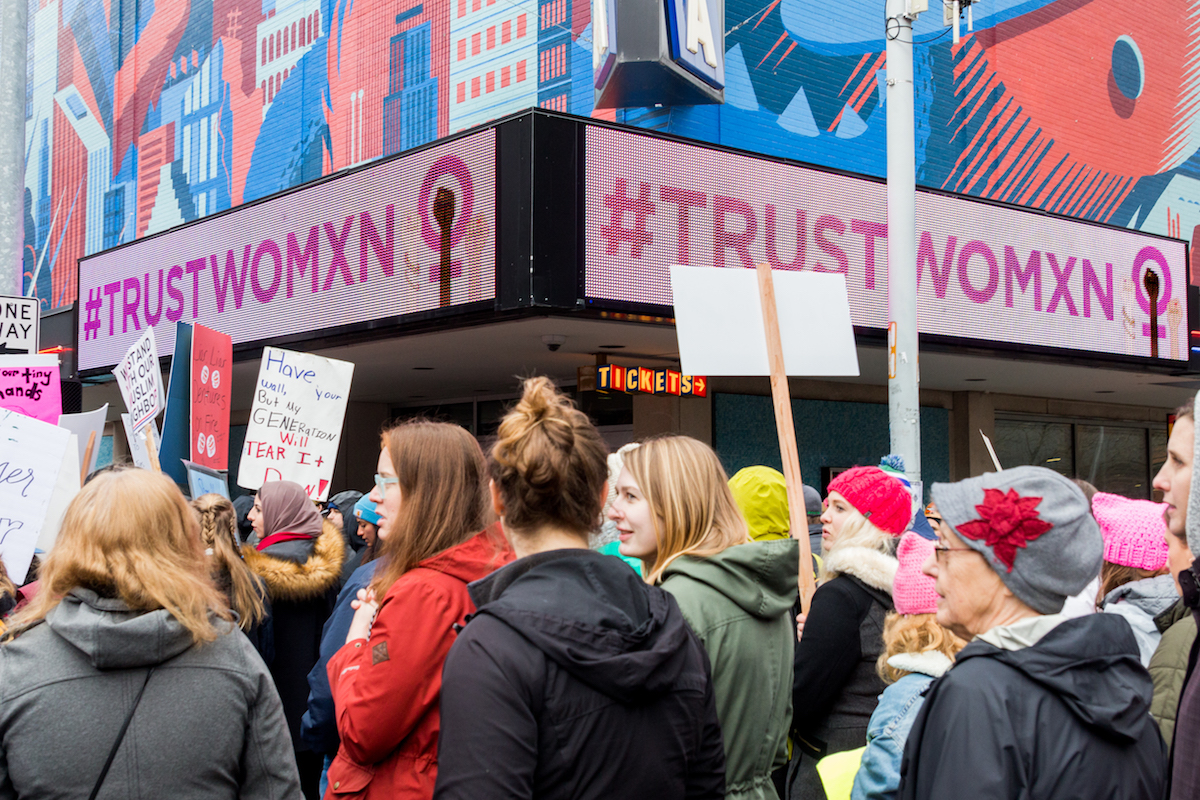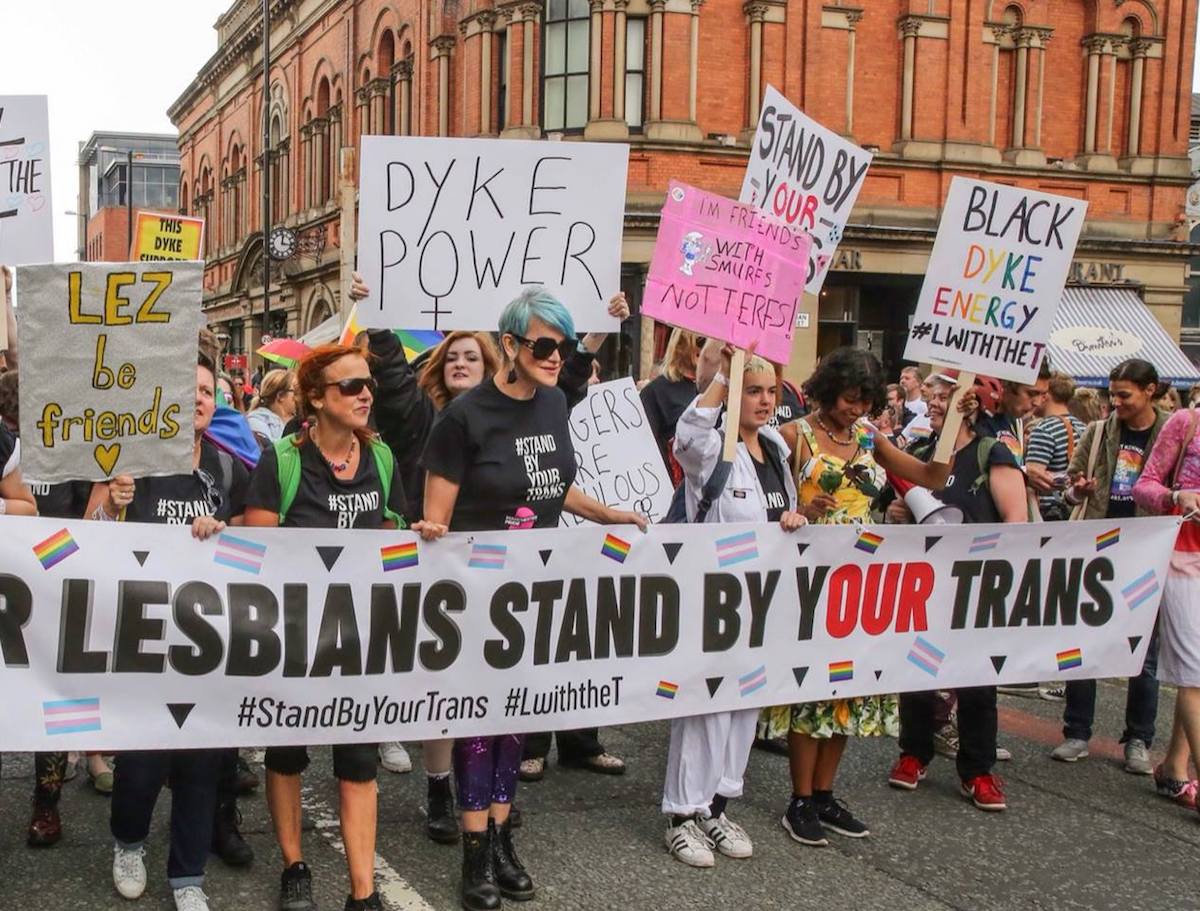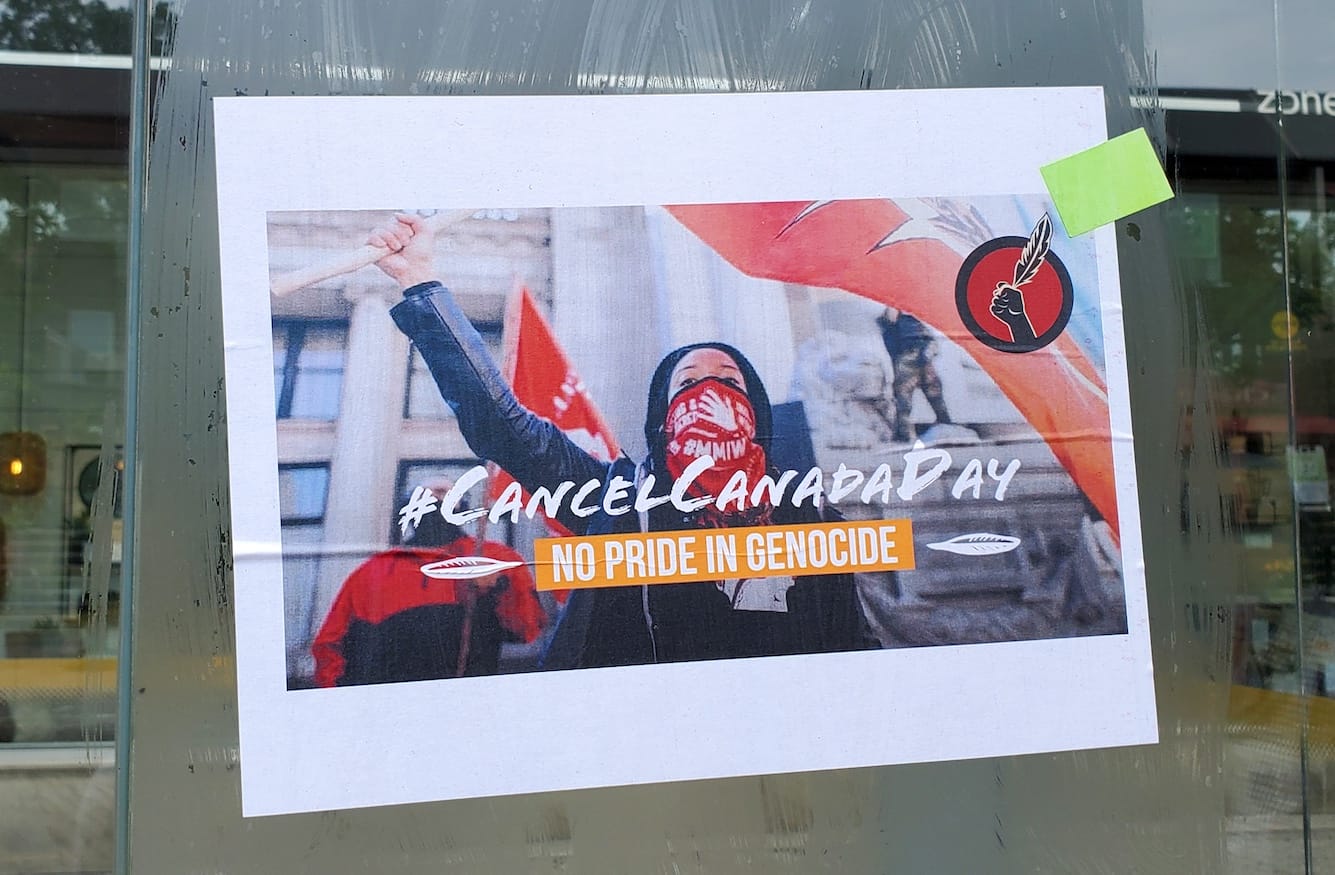feminism
Twitter's Trans-Activist Decree
“Men aren’t women,” and the other asked “How are transwomen not men? What is the difference between a man and a transwoman?”

On November 15, I woke up to find my Twitter account locked, on account of what the company described as “hateful conduct.” In order to regain access, I was made to delete two tweets from October. Fair enough, you might think. Concern about the tone of discourse on social media has been widespread for years. Certainly, many have argued that Twitter officials should be doing more to discourage the vitriol and violent threats that have become commonplace on their platform.
In this case, however, the notion that my commentary could be construed as “hateful” baffled me. One tweet read, simply, “Men aren’t women,” and the other asked “How are transwomen not men? What is the difference between a man and a transwoman?” That last question is one I’ve asked countless times, including in public speeches, and I have yet to get a persuasive answer. I ask these questions not to spread hate—because I do not hate trans-identified individuals—but rather to make sense of arguments made by activists within that community. Instead of answering such questions, however, these same activists insist that the act of simply asking them is evidence of hatred.
The statement that “Men aren’t women” would have been seen as banal—indeed, tautological—just a few years ago. Today, it’s considered heresy—akin to terrorist speech that seeks to “deny the humanity” of trans-identified people who very much wish they could change sex, but cannot. These heretics are smeared as “TERF”—a pejorative term that stands for Trans-Exclusionary Radical Feminist—and blacklisted. On many Twitter threads, the term is more or less synonymous with “Nazi.” Earlier this year, Tyler Coates, an editor at the apparently respectable Esquire magazine, tweeted out “FUCK TERFs!” and promptly got retweeted more than a thousand times.
In many progressive corners of academic and online life, it now is taken as cant that anyone who rejects transgender ideology—which is based on the theory that a mystical “gender identity” exists within us, akin to a soul—may be targeted with the most juvenile and vicious attacks. “Punch TERFs and Nazis” has become a common Twitter tagline, as is the demand that “TERFs” be “sent to the gulag.” (This latter suggestion was earnestly defended in a thread authored by students who run the official Twitter account of the LGBTQ+ Society at a British university. The authors went on to say that the gulag model would, in fact, comprise “a compassionate, non-violent course of action” to deal with “TERFs” and “anti-trans bigots” who must be “re-educat[ed].”)
In other cases, attacks on “TERFs” take the form of taunts that one might hear in middle school. Last August, for instance, The Cut published a lengthy investigation into “TERF bangs.” The author, Amanda Arnold, claimed to be interested in how “short, chunky bangs” came to be wrongly associated with “TERFs”; but of course, the whole thing was a thinly veiled attempt to provoke catty disparagement of women who don’t toe the party line on gender mysticism. And while The Cut may be considered a vacuous fashion blog, it is a vacuous fashion blog run under the auspices of New York magazine.
The reason why engagement with the most militant trans activists is fruitless, and yields only a slew of empty mantras and false stereotypes, is that one cannot argue with religious faith. At the core of transgender ideology is the idea that the old mind/body problem that has bedeviled philosophers for centuries has been definitively solved by gender-studies specialists—and that a female mind can exist within a male body and vice versa. Moreover, we are informed that these mystical phenomena are invisible in all respects, except to the extent that they are experienced from within—which means the only reliable indicator of supposed bona fide transgenderism is the self-declaration of trans-identified individuals (many of whom seem to have made these stunning discoveries as part of a sudden social trend).
In March, the San Francisco Public Library hosted an art exhibit featuring the work of Scout Tran, founder of the Degenderettes, a trans activist group that has taken to showing up at LGBT and women’s events with baseball bats and mock-bloody t-shirts festooned with the words “I punch TERFs.” This is considered very edgy and progressive in the avant-garde scene. One trans exhibit included a display of these gore-themed shirts alongside baseball bats and axes, painted pink and blue. In case there was any doubt that these are intended to be viewed as weapons brandished in the prosecution of a culture war, some of the bats were wrapped in barbed wire—presumably as a threatened means to turn a regular old woman-beating into a maiming, or even a murder.
While it might comfort some to view these threats as performative or theoretical, that isn’t always the case. On May 29, a lesbian named Taelor Furry was beat up outside the Grey Fox Pub, a gay bar in St. Louis, Mo. Her attackers were queer-identified women who had accused Furry of being a “TERF.”
In April, a trans-identified biological male who goes by the name “Tara Wolf” was convicted of assault after beating 60-year-old Maria MacLauchlan, who had gathered with other women at Speaker’s Corner in London’s Hyde Park to discuss mooted gender-identity legislation. Prior to the gathering, this champion of progressive ideals had posted on Facebook, asking where the event would be taking place, as the assailant wanted to “fuck some TERFs up.”
At this year’s Pride March in Montreal, biological males who identify as women led the parade, carrying a banner reading, “Transwomen first/Never again last.” One participant carried a sign with the words, “Begone TERF,” as if he were summoning his mystical powers to cast a hex on we TERFy witches. At Dyke Marches, lesbians who express reservations about making themselves sexually available to suitors who just happen to have penises are now commonly screamed at.
In San Francisco, which one might assume to be a hot spot for lesbian pride, a group of women carrying signs that read, “Proud to be lesbian,” “Lesbian Visibility,” and “Lesbian not queer” were harassed and bullied. Feminist historian Max Dashu, who was in attendance, said she and the other “old lesbians” were surrounded by “young queers” who pushed them and chanted “TERFs, go home.” On Facebook, she wrote: “I’ve been to many marches, including dangerous ones, but this was the most vicious episode I have ever experienced, ever in my life.” As a result of Dashu attending the march alongside these heretic women, she was disinvited as a speaker, most ironically, from a group called the Modern Witches Confluence. When it comes to the campaign against TERFs in trans-compliant progressive circles, even self-described witches now go in for witch hunts.

In Vancouver, Canada, where I live, a group of lesbians attended this year’s Dyke March wearing t-shirts with the word “Lesbian” written overtop a drawing of a uterus, and carrying signs featuring their “lesbian heroes.” Before the march began, they were approached by two members of the Vancouver Dyke March board, who told them they could not participate while wearing these t-shirts and carrying these placards, as they were “trans-exclusionary.” They also were told that if any of their signs featured the venus symbol (which represents “woman”) or “XX,” symbolizing the fact that females have two of the same kind of sex chromosome, they would have to remove them. The group declined to follow these instructions, but joined the march anyway. As the women walked on, they were surrounded by trans activists, who shouted “TERF bigots,” “Transwomen are women,” “This is an inclusive march,” and, “There is no room for hate at the Dyke March.” One trans-identified male-bodied individual ran through their group repeatedly, yelling “Get your ‘Fuck TERF’ pins!” at the women. (Afterwards, the Dyke March board published a statement, labeling the women “TERFs” and “a hate group”: The Vancouver Dyke March, they said, is “upset, angry, and disappointed by the actions of those people who sought to reject and exclude valued members of our communities, including trans folks.”)
Like other women who have been sounding the alarm about these trends, I regularly get accused of spreading moral panic, and of attempting to vilify trans-identified people as inveterate predators. But my issue isn’t with “transgender people,” per se, but, rather, with men. There is a reason certain spaces are sex-segregated—such as change rooms, bathrooms, women’s shelters, and prisons: because these are spaces where women are vulnerable, and where male predators might target women and girls. These are spaces where women and girls may be naked, and where they do not want to be exposed to a man’s penis, regardless of his insistence that his penis is actually “female.”
The internally experienced mystical conceits of a man’s mind do not affect any of the reasons why sex-segregated spaces were created in the first place. Female firefighters in Canada had to fight for years to have their own facilities like locker rooms, bathrooms, and showers, after suffering regular harassment in previously shared spaces. Such are the gains that the radicalized portion of the trans-rights movement wants to roll back. Generations of feminists have made it their life’s work to help women feel safe in historically male spaces. But in the name of ideological fashion, that has been flushed away in the name of male demands for “inclusivity.”
In May, nine homeless women signed on to a lawsuit against Naomi’s House in Fresno, California, after they were forced to shower with a biological man who, while claiming to be a woman, made lewd, sexually inappropriate comments to them, and leered at their naked bodies. In Toronto, similarly, Kristi Hanna filed a human rights complaint against the Jean Tweed Centre, which runs Palmerston House, a shelter for female recovering addicts, after she was told she must share a room with a hulking, plainly male-bodied individual claiming to be a woman.

Beyond being allowed access to this ostensibly female-only facility, this biological male was given special treatment, on account of claimed transgenderism, jumping ahead of two women on the wait list, according to Hanna. Complaints to the staff about his presence were met with the mantra, “We’re inclusive.” Hanna, who has been sexually assaulted multiple times by men, suffers from PTSD and insomnia, on top of struggling with substance abuse issues. After the man’s arrival, she stayed in the room two nights, but felt so unsafe (I use the term here in its literal sense) that she was unable to sleep, and decamped for her sister’s house. “Why don’t my rights matter?” she asked me during a phone interview. “I have a bed there. I pay for that bed. But I can’t go home. I’m barely holding on. I feel so violated.”
In September, the Times of London learned that Natacha Kennedy (also known as Mark Hellen), a researcher at the University of London, had created and circulated a list of academics guilty of failing to subscribe to transgender ideology. According to the newspaper, members of the closed Facebook group, “Trans Rights UK,” through which the list was compiled, “plotted to accuse non-compliant professors of hate crime to try to have them ousted from their jobs,” and targeted a number of university departments because they employed academics who questioned gender-identity dogma. Members of the group, for example, determined that the philosophy department of the University of Sussex was “an unsafe environment” because professor Kathleen Stock had challenged the notion that men could be lesbians. One member of the group reportedly urged: “File a hate-crime report against her, and then the chairman and vice-chair… Drag them over the fucking coals.”
Such tactics may sound hysterical and far-fetched. But they have proven successful in some cases, as I can attest. Last week was not the first time Twitter punished me for criticizing body/mind trans mysticism. I was subjected to multiple suspensions when I noted that a trans-identified biological male and dominatrix in Vancouver who goes by the BDSM name “Hailey Heartless” is actually the same person who led efforts to have a Vancouver rape crisis center and transition house blacklisted and defunded at a 2016 labor union conference (after which this feminist hero was brought on as a speaker at the 2018 Vancouver Women’s March).
The same individual admitted to targeting my website, Feminist Current, by contacting our ad network to complain about our content. As a result, the female-themed website SheKnows pulled all ads from my site, claiming Feminist Current had “failed to comply with the Agreement’s quality guidelines regarding content that attacks a group on the basis of their sexual orientation and/or gender identity.” This was done, according to the company, because of two articles‚ one challenging the violent, misogynist threats that trans activists aim at women and lesbians, and another questioning the smear tactics that trans activists use to shut down critical questions about the transitioning of children and transgender ideology more broadly.
I asked representatives from SheKnows what material within these posts, specifically, constituted “content that attacks a group on the basis of their sexual orientation and/or gender identity,” but received no reply. Similarly, Twitter failed to respond to my request for evidence that I had violated the platform’s “rules against hateful conduct.” Hailey Heartless—who also is known as Lisa Kreut—has publicly bragged about having a contact at “Twitter safety,” which may explain why Kreut’s complaints are taken seriously. Kreut also was part of a small group that signed an open letter smearing local anti-poverty activist Yuly Chan, demanding she be removed from a panel discussing urban renewal at the Vancouver Crossroads conference. Chan had been invited by conference organizers to speak on behalf of her group, the Chinatown Action Group, which organizes to improve the lives of low-income Chinatown residents, many of whom are seniors. As evidence of Chan’s heretical views, Kreut and others complained that Chan was a supporter of Vancouver Rape Relief (VRR), and that she had indicated opposition to the sex trade. Chan was removed from the panel as a result of these complaints.
Yes, you are reading this correctly: A Vancouver civic leader was removed from a panel about urban renewal because she opposes prostitution and supports the provision of support services for rape victims. This is what the progressive face of the gender-identity cult looks like in 2018.
But it didn’t stop there. Kreut’s putative contact at Twitter also sought to cleanse the web of material defending Chan that was written by third parties. Twitter forced me to remove every single tweet I’d posted about the smear campaign against Chan, and Kreut’s involvement in it, as well as every tweet I’d ever posted mentioning Kreut at all. When I appealed these decisions to Twitter, I got a boilerplate response informing me that the service does “not allow people to promote violence against or directly attack or threaten other people on the basis of race, ethnicity, national origin, sexual orientation, gender, gender identity, religious affiliation, age, disability, or disease.” Then again, what should I have expected? Unlike Hailey Heartless, “Western Canada’s Only Transsexual BBW [Big Beautiful Woman] Goddess,” I don’t have any friends working at Twitter.
The Tweet that really seemed to stick under Twitter’s craw was one in which I complained about having been temporarily locked out for two other tweets, one reading, “Men are not women,” and another asking, “How are transwomen not men? What is the difference between men and transwomen?” The complaint had gone viral, with over 20,000 likes. Many women who oppose trans ideology and activism can and do stay under Twitter’s radar. But I had become too widely known, and people were paying attention. Someone clearly wanted to find any way to shut me up. Last Friday night, I got an email from Twitter indicating that my account had been deleted permanently. As before, they could not provide me with any evidence that I had posted anything genuinely hateful.
The tweet I was nominally banned for read only, “Yeah, it’s him,” referring to my having been provided with evidence of the real identity of a man the media had referred to only as “JY”—who had been contacting Vancouver-area aestheticians, seeking a “Brazilian bikini wax” for his apparently female-gendered crotch.
When refused, “JY” filed human rights complaints, seeking financial compensation on account of “discrimination.” Twitter informed me that by referring to JY, I had broken an apparently brand new rule banning users from “misgendering” people. But my tweet had been posted two weeks before users and the media had become aware of any change to Twitter’s Terms of Service. Moreover, “JY” was in fact presenting himself as male during much of this period—including using his male name on Twitter, with his “female” name only in brackets.
From what I can tell, it seems likely that “Hailey Heartless” was telling the truth: The dominatrix, and perhaps even “JY,” have contacts at Twitter who were willing to de-platform me for any reason they could muster. And given the stories I’m hearing of other feminists getting banned from Twitter in recent days, this seems to be part of a larger pattern.
Friends sometimes tell me that I shouldn’t worry too much, because Twitter “isn’t real life.” But online fights have an effect on “real life.” Last month, Canada’s Greystone Books, with which I’d been working on a manuscript for almost three years, told me they were dropping my book. The manuscript had just been completed, and I’d agreed to all the suggested edits with regard to the material on transgenderism. The email sent to me by the owner of the company was completely out of the blue, and explained, “I cannot and will not accept a manuscript for publication at Greystone which is hurtful to individuals or groups because of what they believe about their own gender.” When I responded with shock and confusion, he declined to explain what it was about my analysis that suddenly had become “unacceptable” to him. Presumably, he was just late getting the memo about “TERFs.”
We are indeed in an era of social panic. But this panic isn’t directed at trans-identified individuals, who, in fact, are now called on to lead parades. Rather, the panic is directed at anyone who claims that 2 + 2 = 4. After stickers with the words, “Women don’t have penises” appeared on campus at Memorial University in St. Johns, Newfoundland, Jennifer Dyer, interim head of the gender studies department, blamed “TERFs.” And university president Gary Kachanoski responded immediately with a statement that called the stickers “transphobic” and “hateful.” Bailey Howard, director of external affairs for the Student Union, said that not one, but two meetings were being planned to “discuss next steps.” An anchor for NTV, Newfoundland’s provincial news program, labeled it a “hate crime.” All of this hysteria was set in motion by a set of stickers that express a sentiment endorsed, at least privately, by most members of our society. It feels like a Monty Python sketch come to life.
I was angry to have lost a Twitter account with tens of thousands of followers. I was angry to have lost a book deal. But I will recover. I am resilient, if nothing else. I will find another publisher and other ways to communicate with the public. I have countless supporters, and my career is far from over. Certainly, I don’t plan on shutting up.
But this isn’t just about me. It’s about a cultish movement that is flexing its muscle on campuses, in civic organizations, at public events, and in the back offices of social-media companies, to strike down anyone who dares point out that the gender emperor wears no clothes. It is about our ability to debate important issues and speak the truth in the public realm. It’s time for all of us—not just women and feminists, who are now taking the worst of it—to put their collective foot down and demand a return to sanity.






